
Rhythm and blues, frequently abbreviated as R&B or R'n'B, is a genre of popular music that originated within the African-American community in the 1940s. The term was originally used by record companies to describe recordings marketed predominantly to African Americans, at a time when "rocking, jazz based music ... [with a] heavy, insistent beat" was starting to become more popular. In the commercial rhythm and blues music typical of the 1950s through the 1970s, the bands usually consisted of a piano, one or two guitars, bass, drums, one or more saxophones, and sometimes background vocalists. R&B lyrical themes often encapsulate the African-American history and experience of pain and the quest for freedom and joy, as well as triumphs and failures in terms of societal racism, oppression, relationships, economics, and aspirations.
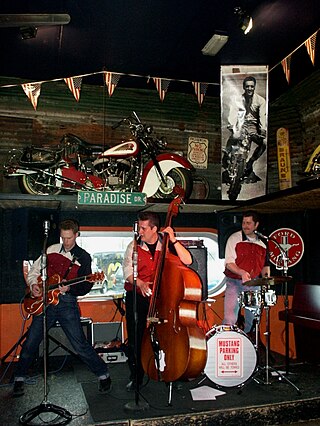
Rockabilly is one of the earliest styles of rock and roll music. It dates back to the early 1950s in the United States, especially the South. As a genre, it blends the sound of Western musical styles such as country with that of rhythm and blues, leading to what is considered "classic" rock and roll. Some have also described it as a blend of bluegrass with rock and roll. The term "rockabilly" itself is a portmanteau of "rock" and "hillbilly", the latter a reference to the country music that contributed strongly to the style. Other important influences on rockabilly include western swing, boogie-woogie, jump blues, and electric blues.
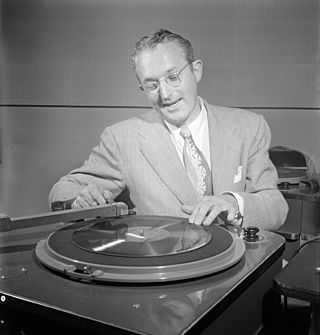
Thomas Francis Dorsey Jr. was an American jazz trombonist, composer, conductor and bandleader of the big band era. He was known as the "Sentimental Gentleman of Swing" because of his smooth-toned trombone playing. His theme song was "I'm Getting Sentimental Over You". His technical skill on the trombone gave him renown among other musicians. He was the younger brother of bandleader Jimmy Dorsey. After Dorsey broke with his brother in the mid-1930s, he led an extremely successful band from the late 1930s into the 1950s. He is best remembered for standards such as "Opus One", "This Love of Mine" featuring Frank Sinatra on vocals, "Song of India", "Marie", "On Treasure Island", and his biggest hit single, "I'll Never Smile Again".
Sir Leslie Ronald Young, known professionally as Jimmy Young, was an English singer, disc jockey and radio personality. Early in his career in the 1950s he had two number ones, "Unchained Melody" and "The Man from Laramie", both in 1955, and several other top ten hits in the UK chart, but he became better known for his long-running show on BBC Radio 2, The JY Prog, which ran from 1973 until 2002.
"Mack the Knife" or "The Ballad of Mack the Knife" is a song composed by Kurt Weill with lyrics by Bertolt Brecht for their 1928 music drama The Threepenny Opera. The song tells of a knife-wielding criminal of the London underworld named Macheath, the "Mack the Knife" of the title.
"Unchained Melody" is a 1955 song with music by Alex North and lyrics by Hy Zaret. North wrote the music as a theme for the prison film Unchained (1955), hence the song title. Todd Duncan sang the vocals for the film soundtrack. It has since become a standard and one of the most recorded songs of the 20th century, most notably by the Righteous Brothers in 1965. According to the song's publishing administrator, over 1,500 recordings of "Unchained Melody" have been made by more than 670 artists, in multiple languages.

"Georgia on My Mind" is a 1930 song written by Hoagy Carmichael (1899–1981), and Stuart Gorrell (1901–1963), and first recorded that same year by Hoagy Carmichael at the RCA Victor Studios at 155 East 24th Street in Manhattan of New York City. However, the song has been most often associated with soul singer Ray Charles (1930–2004), who was a native of the U.S. state of Georgia in The South of the United States, and recorded it for his 1960 album The Genius Hits the Road.
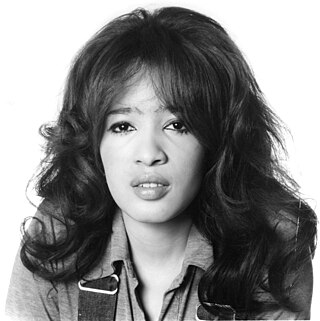
Veronica Yvette Greenfield was an American singer who co-founded and fronted the girl group the Ronettes. She is sometimes referred to as the original "bad girl of rock and roll".

"I'm a Believer" is a song written by Neil Diamond and recorded by the American band the Monkees in 1966 with the lead vocals by Micky Dolenz. The single, produced by Jeff Barry, hit the number-one spot on the U.S. Billboard Hot 100 chart for the week ending December 31, 1966, and remained there for seven weeks becoming the last number-one hit of 1966 and the biggest-selling single for all of 1967. Billboard ranked the record as the number-five song for 1967. While originally published by Screen Gems-Columbia Music (BMI), it is now published by Stonebridge Music/EMI Foray Music (SESAC), with administration passed to Sony Music Publishing and Universal Music Publishing Group.
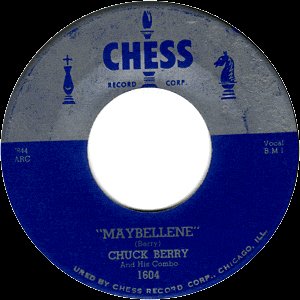
"Maybellene" is a rock and roll song by American artist Chuck Berry, adapted in part from the western swing fiddle tune "Ida Red". Released in 1955, Berry’s song tells the story of a hot rod race and a broken romance, the lyrics describing a man driving a V8 Ford and chasing his unfaithful girlfriend in her Cadillac Coupe DeVille. It was released in July 1955 as a single by Chess Records, of Chicago, Illinois. Berry's first hit, "Maybellene" is considered a pioneering rock and roll song. Rolling Stone magazine wrote of it, "Rock & roll guitar starts here." The record was an early instance of the complete rock and roll package: youthful subject matter; a small, guitar-driven combo; clear diction; and an atmosphere of unrelenting excitement.

"Ain't That a Shame" is a song written by Fats Domino and Dave Bartholomew. Domino's recording of the song, originally stated as "Ain't It a Shame", released by Imperial Records in 1955, was a hit, eventually selling a million copies. It reached number 1 on the Billboard R&B chart and number 10 on the pop chart. The song is ranked number 438 on Rolling Stone magazine's 500 Greatest Songs of All Time list.

"Sunshine on My Shoulders" is a song recorded and co-written by American singer-songwriter John Denver. It was originally released as an album track on 1971's Poems, Prayers & Promises and later, as a single in 1973. It went to No. 1 on the Billboard Hot 100 chart in the U.S. in early 1974.

"Baby, Please Don't Go" is a traditional blues song that was popularized by Delta blues musician Big Joe Williams in 1935. Many cover versions followed, leading to its description as "one of the most played, arranged, and rearranged pieces in blues history" by French music historian Gérard Herzhaft.
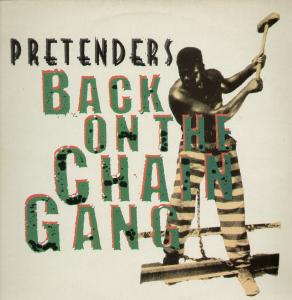
"Back on the Chain Gang" is a song written by American-British musician Chrissie Hynde, originally recorded by her band the Pretenders and released as a single by Sire Records in September 1982. The song was included on The King of Comedy soundtrack album in March 1983 and was later included on the Pretenders' third album, Learning to Crawl, in January 1984.

"Rock On" is a song written by English singer David Essex. Recorded in 1973 and released as a single by Essex, it became an international hit. In 1989, American actor and singer Michael Damian recorded a cover version that went to number one on the Billboard Hot 100 chart. The song has been recorded many times, including a 2006 version by the English hard rock group Def Leppard.
Robert William Scott was an American musician, record producer, and songwriter.

"Tunnel of Love" is the title song by Bruce Springsteen from his 1987 Tunnel of Love album. It was released as the second single from the album, reaching #9 on the Billboard Hot 100 as well as #12 on the Cash Box Top 100. Like the first single from the album, "Brilliant Disguise", "Tunnel of Love" reached number one on the Mainstream Rock Tracks chart and reached the top twenty in Canada peaking at #17. The music video received five MTV Video Music Awards nominations, including Video of the Year and Best Male Video.
Gordon "Whitey" Mitchell was an American jazz bassist and television writer/producer. He was born in Hackensack, New Jersey.

Moon River and Other Great Movie Themes is the ninth studio album by American pop singer Andy Williams. It was released on March 26, 1962, by Columbia Records and covered film songs that were mostly from the previous decade.

Rick Is 21 is the sixth studio album by rock and roll and pop idol Rick Nelson, and was released on May 8, 1961, by Imperial Records. The album was almost entirely recorded in Los Angeles, California, United States at the famous United Western Recorders studios from February to April, 1961. it features songs by Dorsey Burnette, Jerry Fuller, and Dave Burgess. Only one song was recorded at Master Recorders studios in Hollywood, California, United States. That song was: Do You Know What it Means To Miss New Orleans recorded in February, 1960. The album was the first to credit his first name as "Rick"; previous albums were credited to Ricky Nelson. Jimmie Haskell was the arranger and Charles "Bud" Dant was the producer.














